|
Abbassa Village where Oranges and Mangoes grow
Apr 22, 2010 | |
Help Arrives for the Forgotten communities of Sri Lanka's former border villages
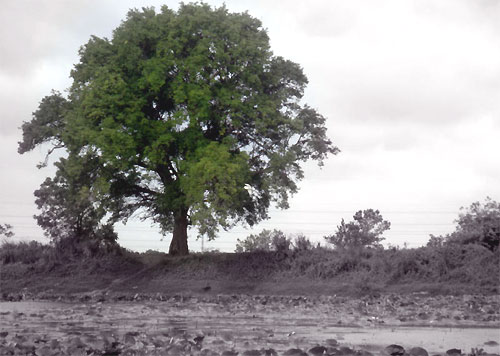 The forgotten communities of Sri Lanka's former border villages. Have you any idea what it is like to be part of them? After thirty years in the grip of Tamil Tiger terrorism, these farmer families have forgotten how to live. The ever-present fear of death during three decades had killed everything worthwhile in their lives. Ultimately, it became a battle for survival by instinct. Civilization, culture, good manners, religion and education had no place in their hunted existence. The traditional pillars of civilized living - the village temple and the school, were abandoned and dysfunctional, and, in some instances, swallowed up by the jungle. By day, these frightened communities cowered at every unexpected movement and every loud noise, anticipating death at every turn. By night, they sought protection in bunkers built close to their homes, afraid to sleep for fear of being massacred in the dark. When authorities asked them to get to state-run camps at night, they decided to sleep in the forest instead. Some unfortunate people died of snakebite. Some unsuspecting, trusting girls were raped. Young people who had lost hope for a better tomorrow, grabbed at whatever pleasure they could get. Teenagers gave into their hormones and eloped with lovers, only to return to their parents with babies at an age they should be getting married. Aged, ailing parents whose grown up children were murdered by the Tigers, overwhelmed by sheer helplessness, committed suicide. Amidst all the chaos, the mostly chena cultivators were caught in an endless, losing battle to make ends meet. The crops like cowpea, mung bean and turnip that they grew in the harshest of conditions, earned them but a pittance. This is a typical situation of hundreds of farmer communities in the former border villages. This is also true of Abbassa, a remote village adjoining the southern boundary of the Yala wildlife sanctuary, tucked away in the midst of dense scrub jungle in Illukpitiya, in the Monaragala District, Buttala. Life is very basic in this community, without electricity and pipe-borne water, and inaccessible to the larger society, until several dirt roads were dug recently. Upon initial contact with this community of forty-two farmer families, it is heart breaking to realize how indelibly scarred they are by Tamil Tiger terrorism. During the Tigers' desperate sunset hours in 2008, a group of terrorists who had been hiding in the Yala sanctuary, descended on this village with hacksaws, brutally massacring the most vulnerable in the community. Some months later, when grief was yet raw, several more of them died when Tigers exploded a bomb at a bend of the road when the bus they were travelling on was slowly pulling uphill. Fear of brutal slayings and unvarnished terror was ever-present and almost tangible. 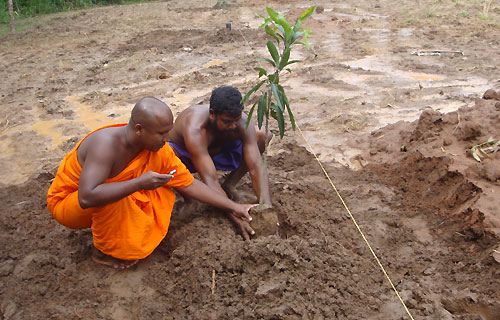 Ven. Dhammatillaka the saviour of the Abbassa community
It is in this pitiable state that Ven. Karawilakotuwe Dhammatillaka found the village of Abbassa, when he returned as an educated Buddhist monk, to his birthplace of Buttala, in November 2009. The meager state funds and the cursory attention Abbassa was then receiving, were woefully inadequate. He knew he had to help the people regain their dignity and value as civilized human beings. The people needed to begin life anew, with a livelihood that could support them and a structured system of education to ensure a future for their young and teenaged kids. Yet, the biggest problem that loomed from amidst endless obstacles was that the villagers of Abbassa had almost no resources. No wells dug for potable water, no seedlings, no agricultural implements, no fertilizer, so cultivation was a lost cause. No school within four kilometers so children often got no education. No pre-school in the area so toddlers grew up without instruction. By chance, Abbassa fell on the radar screen of a local charity, Jayagrahana Lanka Foundation. This organization recognized the tremendous challenge Ven. Dhammatillaka had undertaken and volunteered support and assistance. Jayagrahana, with its global connections, found like minds and hearts in the US. The Bodhi Foundation based in Los Angeles, California, has offered financial assistance to the farmers of Abbassa through the Jayagrahana Lanka Foundation.
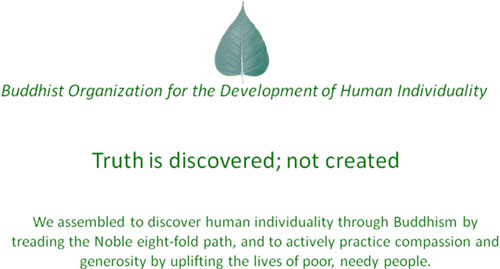 BODHI Foundation in Los Angeles, California
Although the needs of the community are diverse, priority of focus is on assisting the farmers to achieve a better quality of life by engaging in more lucrative plantation. Thus, they are no longer growing cowpea and mung bean. They are enthusiastically planting mango and orange, guided by the committed Ven. Dhammatillaka. The juicy, sweet and immensely popular Karthakolomban thrives on that particular soil. So do two indigenous varieties of orange - Maduranketiya and Bibile Sweet. 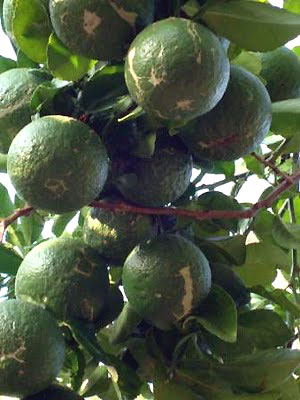 Bibile Sweet oranges long disappeared from Bibile, find a new habitat in Abbassa
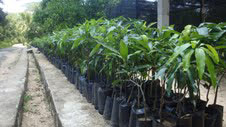 Healthy Karthakolomban seedlings for Abbassa Each acre of land planted will have forty-five mango plants and ten orange plants. Already twenty-four acres of land belonging to the farmer families are under plantation. The trees will bear fruit in three or four years. Ven Dhammatilleke envisions a future, where one thousand acres belonging to farmer families in the former border villages, on the banks of the Kumbukkan Oya, will have thriving mango and orange plantations. That is in the distant future, with so many obstacles to overcome. For the present, the villagers of Abbassa need to live until the orange and mango trees bear fruit. The thirty feet of land between rows of mango trees provide adequate space for cultivating a variety of grains, red onions, peanuts and kurakkan, so the farmers could earn a living while waiting for the mango and orange groves to spring up.
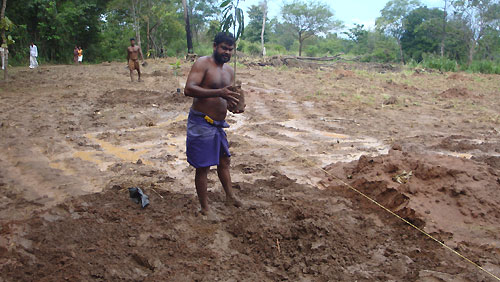 Ven. Dhammatillaka has already launched the construction of a pre-school for the village. He has engaged the services of a psychologist from Colombo to educate the teenagers on sex, marriage and family, while he gently instructs them on Buddhist philosophy. The ultimate aim is a moral and educated community to build lives of quality and dignity for the next generation. These forgotten communities of yesterday are no more among the forsaken. The annihilation of the Tamil Tigers has brought positive results in many ways. And one of those, is shedding light on the plight of these farming communities. The compassion and generosity of the more fortunate will surely help things along for the village of Abbassa. The cup of hope is filling, slowly but surely, as Abbassa waits with bated breath. For more details of the project, please contact Ananda Markalanda by email markalanda@gmail.com.
|
|
|
| |